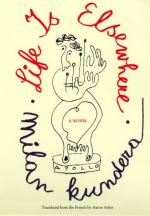
|
| Name: _________________________ | Period: ___________________ |
This test consists of 15 multiple choice questions and 5 short answer questions.
Multiple Choice Questions
1. Why is 1949 an interesting year for Czech youth?
(a) They have no idea how to implement their ideas for the future.
(b) Their Marxist ideas are taking hold more quickly than they ever expected.
(c) Their jubilance is both voluntary and mandatory.
(d) They have destroyed the past but have no future.
2. What happens as Maman sees her son's physicality?
(a) She begins to accept her own physicality.
(b) Her tenderness increases.
(c) She becomes even more revolted by physicality.
(d) She begins to question her sexuality.
3. What kind of dog does the art teacher have?
(a) A Great Dane.
(b) An Alsatian.
(c) A Dalmatian.
(d) A St. Bernard.
4. During the Marxist debate which Jaromil attends, how does one person cause a distraction?
(a) Tapping his foot against his chair leg.
(b) Reading random sections of Marx's writing.
(c) Elbowing the girl next to him whenever the speaker makes a good point.
(d) Periodically sniffing a wilted lily.
5. When do Jaromil's parents redecorate his room?
(a) The day after his grandpa's funeral.
(b) The night before his sixth birthday.
(c) The night before his fifth birthday.
(d) The day before Christmas when he is six.
6. Why does Jaromil like the girl in the white coat who works at the store?
(a) She reminds him of his old maid, Magda.
(b) She looks like his mother when she was young.
(c) He is attracted to women who wear white.
(d) She has a great revolutionary spirit.
7. What can only a true poet know?
(a) The desire to write a life-changing poem.
(b) The desire to live in a world without mirrors.
(c) The desire not to be a poet.
(d) The desire to be a part of the world.
8. How does the artist show Maman that he is not interested in a relationship with her?
(a) Treats her like a friend when she goes to his apartment.
(b) Shows her new paintings of his girlfriend.
(c) Tells her everything about his girlfriend.
(d) Tells her he does not want to see her again.
9. According to Kundera, what is "tenderness"?
(a) The sheltering of a child so that he does not mature.
(b) The proper response of a parent to the child.
(c) Treating the woman like a child, for fear of consequences.
(d) The affection of the woman for her lover.
10. With whom does the famous poet appear on the street?
(a) An imposing policeman who personifies his beliefs.
(b) A common girl taken from the hubbub of life.
(c) A pretty girl who looks like a fashion model.
(d) His mother.
11. To what does Jaromil poetically compare Magda?
(a) Ice and cruelty.
(b) Water and sorrow.
(c) Earth and stability.
(d) Fire and passion.
12. According to Maman, where was the poet conceived?
(a) In the countryside near Prague.
(b) In her apartment.
(c) In the apartment of the father's colleague.
(d) On a park bench.
13. According to Kundera, what is "the first precondition of freedom" (Part III, Chapter 18, pg 121)?
(a) Being able to love without guilt.
(b) Never having parents.
(c) Never having children.
(d) Losing parents in death.
14. What classic womanly question does the university girl ask Jaromil?
(a) If she looks fat in her dress.
(b) If he will love her forever.
(c) If she looks better clothed or unclothed.
(d) How many kids he wants.
15. Why is Jaromil especially proud of the slogan "No churches"?
(a) He hates the idea of God.
(b) Church reminds him of his mother.
(c) The youth of today do not need to be burdened by religion.
(d) The statement erases two thousand years of history.
Short Answer Questions
1. How do Jaromil and Maman reach the lake resort?
2. What are the four students singing about while on the train?
3. What is the first time Jaromil's words save him from punishment?
4. What was the dramatic action that led to the kiss between Jaromil and the university girl?
5. What does Jaromil draw during his first lesson in the artist's studio?
|
This section contains 685 words (approx. 3 pages at 300 words per page) |

|




